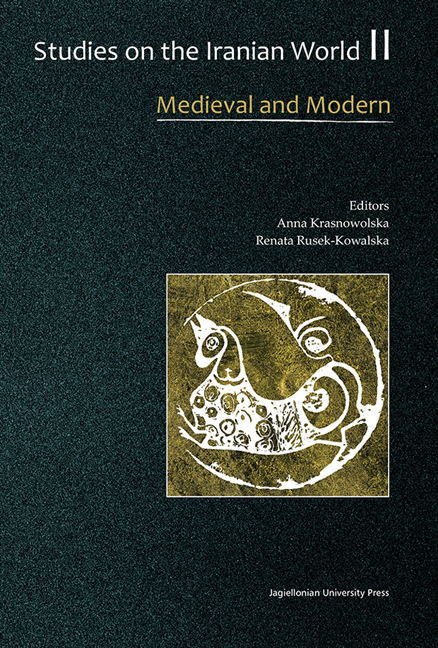Book contents
- Frontmatter
- Contents
- Foreword
- Linguistics
- Literature
- Religion
- History
- The Failure of the Constitutional Monarchy in Iran: The Socio- and Psycho-Genesis of Reza Khan's Rise to Power
- Concerning One Unpublished Persian Historical Document from Afshar Period
- Clash or Compromise? Mongol and Muslim Law in the Ilkhanate (1258–1335)
- New Insights on the Fiscal System of the Early Ilkhanids through the Analysis of al-Murshid fī al-Ḥisāb, an Unknown Accounting Manual
- Archaeological Survey of Kamar-e Marj Castle in Kermān Province
- Historians of their Time: Mongols, Mamluks and the Treatment of the Past
- Arts
- Social and Cultural Studies
New Insights on the Fiscal System of the Early Ilkhanids through the Analysis of al-Murshid fī al-Ḥisāb, an Unknown Accounting Manual
from History
Published online by Cambridge University Press: 12 January 2018
- Frontmatter
- Contents
- Foreword
- Linguistics
- Literature
- Religion
- History
- The Failure of the Constitutional Monarchy in Iran: The Socio- and Psycho-Genesis of Reza Khan's Rise to Power
- Concerning One Unpublished Persian Historical Document from Afshar Period
- Clash or Compromise? Mongol and Muslim Law in the Ilkhanate (1258–1335)
- New Insights on the Fiscal System of the Early Ilkhanids through the Analysis of al-Murshid fī al-Ḥisāb, an Unknown Accounting Manual
- Archaeological Survey of Kamar-e Marj Castle in Kermān Province
- Historians of their Time: Mongols, Mamluks and the Treatment of the Past
- Arts
- Social and Cultural Studies
Summary
SUMMARY
Scholars have noticed that the Ilkhanid fiscal administration in Iran led to the economical crisis until the seventh Ilkhan Ghāzān Khān's enthronement. However the fiscal management system of the early Ilkhanid dīwān is not clear. This paper through the preliminary analysis of Al-Murshid fī al-Ḥisāb, an unknown accounting manual before Ghāzān's reforms, provided new information regarding some important aspects of the early Ilkhanid fiscal system: the method of census to assess qupchūr (the poll tax) and extraordinary levies for military expenditures.
INTRODUCTION
The Mongol rule in the thirteenth and fourteenth centuries had various impacts on Iranian society. In order to understand the political, social, and cultural conditions of Iran in this period, we need more detailed studies on the ruling systems of the Ilkhanids (1256–1355), including the taxation system introduced by the Mongols, which levied taxes such as the poll tax (qupchūr) and commercial tax (tamghā).
Many scholars have agreed that the fiscal policy of the Ilkhanids led to a catastrophic financial crisis until the enthronement of the seventh Ilkhan, Ghāzān Khān (r. 1295–1304), who made various administrative reforms to restore the fiscal condition of the dynasty. However, we have very little information regarding the fiscal management system of the Ilkhanid dīwān (a ministry office) led by the ṣāḥib-dīwān or wazīr. We do not have reliable resources to find what kind of dīwānī system contributed to the fiscal crisis in the early Ilkhanid period. As historical resources of the fiscal system in the fourteenth century, we have some Persian accounting manuals, Sa‘ādat Nāma, Jāmi’ al-Ḥisāb, Risala’-i Falakiya, and so on. It is well known that various characteristics of the Mongol fiscal system can be observed in these manuals written for fiscal bureaucrats. However, since they were written after Ghāzān's reign and after the fall of the Ilkhanids, they include very little information available regarding the Mongol fiscal system in the early Ilkhanid period.
This paper analyzed some examples in Al-Murshid fī al-Ḥisāb, an accounting manual written in the end of the thirteenth century, to provide some useful information regarding the fiscal bureaucratic system in the early Ilkhanid period.
AL-MURSHID FĪ AL-ḤISĀB AND ITS CONTENTS
Al-Murshid fī al-Ḥisāb was written by al-Ḥasan b. ‘Alī. According to his autobiography in the preface, he had served in the fiscal bureau for many years.
- Type
- Chapter
- Information
- Studies on the Iranian WorldMedieval and Modern, pp. 197 - 204Publisher: Jagiellonian University PressPrint publication year: 2015

